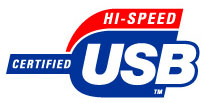USB 2.0 - Working Away At 480Mbps
The USB standard that all of us are currently using to power our mice, MP3
players, scanners, printers and assorted other peripherals is technically
USB1.1. When it was originally introduced it was a heck of a lot faster than
anything else around. Now USB1.1 is dated and ready to be usurped by
a newer, faster standard you may have heard rumblings about. That new
standard is called USB 2.0.
 USB 2.0
operates at 480Mbps, about 40X times faster than USB 1.1 which currently works
at a snails pace of just 12Mbps. For arguments sake, IEEE 1394 Firewire has
transfer speeds of 400Mbps and has been around for a year or two now. Having had
a taste of Firewire which has seen itself largely segmented to the digital video
marketplace, USB2.0 is an exciting development. While there have been many
devices launched under FireWire that enabled computers to have hard drives,
CD-burners and similar devices located externally, the mainstream PC market
never really seemed to embrace it - possibly due to the fact that it has become
a standard on Mac computers.
USB 2.0
operates at 480Mbps, about 40X times faster than USB 1.1 which currently works
at a snails pace of just 12Mbps. For arguments sake, IEEE 1394 Firewire has
transfer speeds of 400Mbps and has been around for a year or two now. Having had
a taste of Firewire which has seen itself largely segmented to the digital video
marketplace, USB2.0 is an exciting development. While there have been many
devices launched under FireWire that enabled computers to have hard drives,
CD-burners and similar devices located externally, the mainstream PC market
never really seemed to embrace it - possibly due to the fact that it has become
a standard on Mac computers.
While I have yet to see any mainstream manufacturer, or any for that matter
drop IEEE 1394 FireWire onto a motherboard, MSI have already done the very same
with USB 2.0 - a very good sign that it will see wide implementation amongst PC
makers.
Wide implementation opens up the doors for more external devices like hard
drives, CD-burners, DVD drives and other data-have devices. While this was
technically possible with USB1.1, the data transfer times were so slow that it
became impractical vs. IDE. With speeds of 480Mbps, USB2.0 takes care of these
issues in almost the same manner that FireWire has. The main benefit is of
course the backwards compatibility (both in terms of devices and interfaces) and
lower cost of implementation USB2.0 brings to the table. USB2.0 uses the exact
same cables and ports.
| Standard |
Transfer Speed |
| USB 2.0 |
480 Mbps |
| USB 1.1 |
12 Mbps |
| Firewire (IEEE1394) |
400 Mbps |
| Parallel Port |
1 Mbps |
| Serial Port |
0.115 Mbps |
At the moment, USB2.0 drivers are not native to Windows XP. This may change
with subsequent updates, and as more devices make the upgrade to the new
standard. Intel have recently announced the D850MV-SE, a USB2.0 enabled
Pentium 4 (RDRAM), and MSI have the 845Pro2-RU with USB2.0 support via NEC
chipset. The groundwork is also there for USB2.0 networking, which would offer
fast connectivity between PC's like MSI's PC-to-PC technology currently does on
the USB1.1 standard.
Companies currently offering USB2.0 peripherals include: ACOM, Adaptec,
Addonics, ADS Technologies, Archos, Argosy Research, ATEN Technology, Belkin,
BusLink, DataFab Systems, DoTop Technology, Dura Micro, Fellowes Manufacturing,
Fujitsu, Good Way Technology, I-O Data Device, Iogear, LaCie, Maxtor, Melco,
Microtek International, Opteon Corp, Orange Micro, Pacific Digital, Plextor,
QPS, Quik Tech Solutions, Ratox Systems, RocketPod, Seiko Epson, Siig, Sony,
System Talks, and Yamaha who have a 20X CD-RW Recorder.

